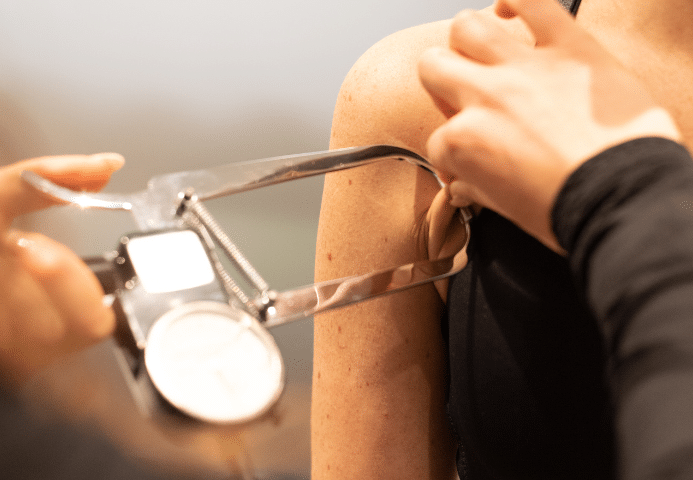When it comes to assessing fitness, most people focus on traditional measures like weight lifted, number of repetitions, or the distance run. While these metrics are valuable, they don’t always provide the full picture of physical performance or muscular health. This is where functional strength testing comes in – a critical component of understanding how well your muscles work together in real-world scenarios. With tools like Takei Muscle Strength Testers, fitness professionals, coaches, and researchers can delve deeper into functional strength to unlock better performance, health, and recovery outcomes.
What is Functional Strength Testing?
Functional strength testing assesses how effectively your muscles work in activities that mimic real-world tasks. Unlike traditional gym exercises, which often isolate specific muscle groups, functional strength testing evaluates:
- Integrated muscle performance: How different muscle groups work together.
- Explosive power and endurance: Vital for sports performance.
- Balance and stability: Key indicators of injury risk and recovery.
By assessing these aspects, functional strength testing helps identify strengths, weaknesses, and potential areas for improvement.
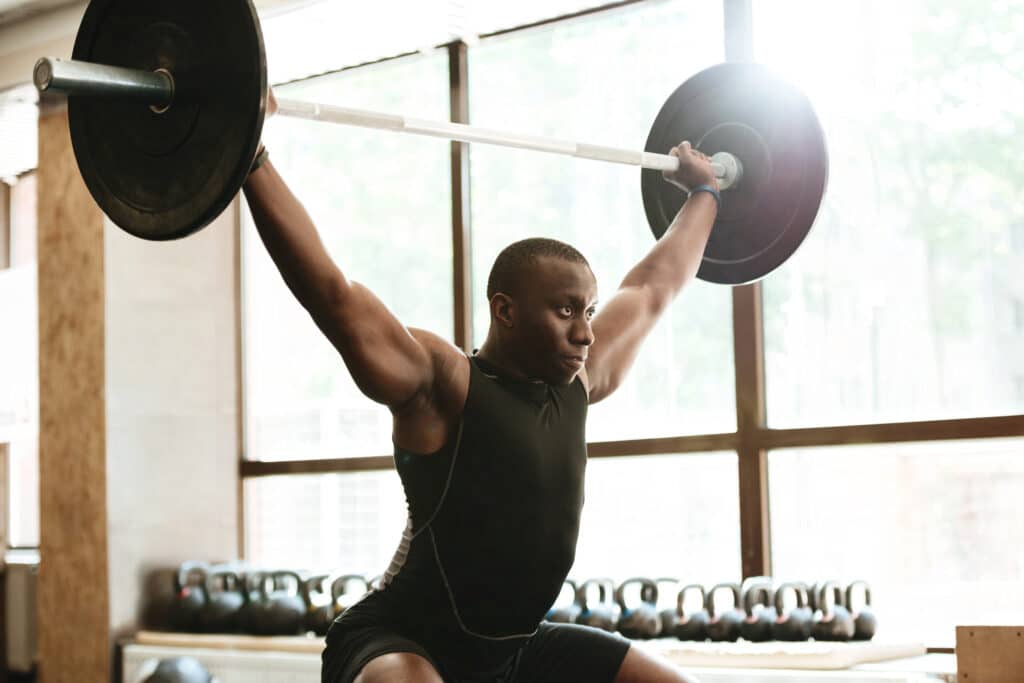
The Role of Takei Muscle Strength Testers
Takei Muscle Strength Testers are renowned for their precision and versatility in measuring muscle strength. These portable devices are designed to provide objective, accurate data, making them invaluable for professionals in sports science, rehabilitation, and general fitness. Some of the key features include:
- High accuracy: Provides reliable data to track progress over time.
- Versatile application: Tests different muscle groups, from grip strength to leg power.
- Ease of use: Compact, lightweight, and simple to operate, making them suitable for clinics, gyms, or on-the-go assessments.
Why Functional Strength Testing Matters
1. Improves Training Programmes
Understanding functional strength allows trainers to design more personalised training programmes. For example, a Takei Grip Strength Tester can measure grip strength, which is crucial for athletes in sports like climbing or rugby. Weaknesses revealed through testing can then be targeted with specific exercises.
2. Prevents Injuries
Functional strength testing highlights imbalances in the body that could lead to injuries. Takei Muscle Strength Testers are particularly useful in detecting these issues early, enabling proactive injury prevention strategies.
3. Supports Rehabilitation
For those recovering from injuries or surgeries, Takei devices can measure progress objectively. By tracking muscle recovery, healthcare professionals can adjust rehabilitation protocols to maximise recovery while minimising risk.
4. Enhances Performance
Athletes can use functional strength testing to identify performance bottlenecks. By focusing on functional movements and specific muscle groups, Takei Muscle Strength Testers provide actionable data for optimising performance.

Popular Takei Muscle Strength Testers
1. Takei Grip Strength Dynamometer
This device measures grip strength, a key indicator of overall muscular health. Grip strength is linked to longevity, cardiovascular health, and performance in various sports. The Takei Grip Strength Dynamometer is portable and easy to use, making it an essential tool in diverse settings, from clinics to sports facilities.
Additionally, it is often used as a quick screening tool for overall body strength. Studies have shown that grip strength correlates with other health markers, including reduced risk of falls in older adults and enhanced athletic performance in sports requiring upper-body strength. For example, Bohannon et al. (2019) noted that grip strength is a reliable predictor of overall mortality and functional decline.
https://jhpn.biomedcentral.com/articles/10.1186/s41043-024-00500-y
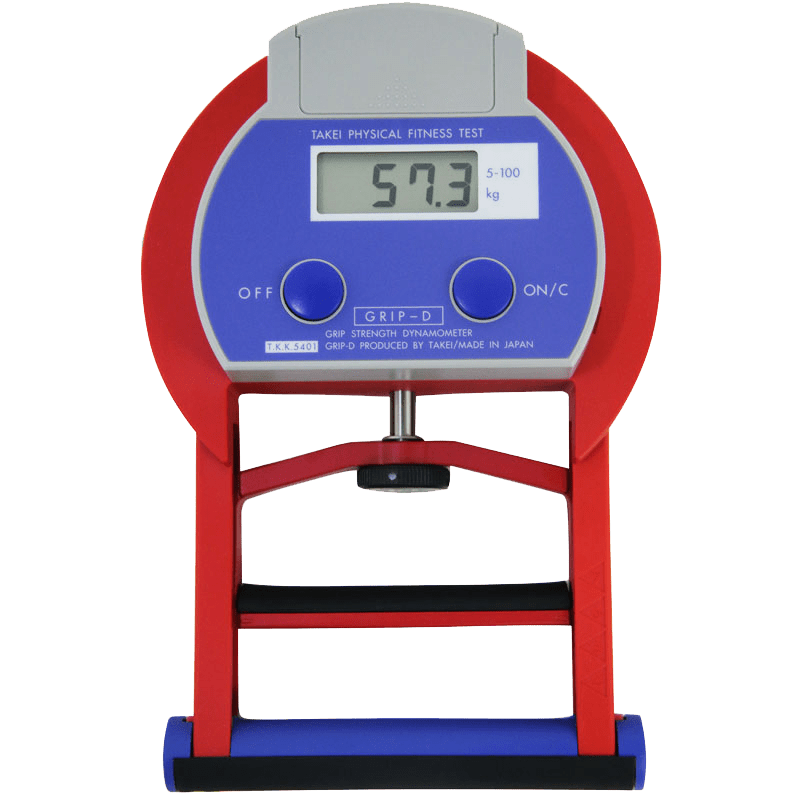
Takei Hand Grip Dynamometer
The Takei Hand Grip Dynamometer is a simple and popular test for general strength level.
The isometric design will ensure accurate and reproducible results for evaluation of grip strength.
2. Takei Back and Leg Dynamometer
Used for assessing the strength of the back and core muscles, this tester is ideal for sports involving heavy lifting or maintaining stability under dynamic conditions.
It is widely utilised in both athletic and clinical environments to evaluate postural stability and lifting mechanics. Studies such as those by McGill (2010) highlight the importance of core strength in preventing lower back injuries and improving lifting mechanics. The data provided by this device can inform strength training programmes focused on improving core stability and reducing the risk of lower back injuries, particularly for individuals engaged in occupations or sports that demand robust back strength.
https://www.bewegenismedicijn.nl/files/downloads/mcgills_2010_-_core_training__injury_prevention.pdf
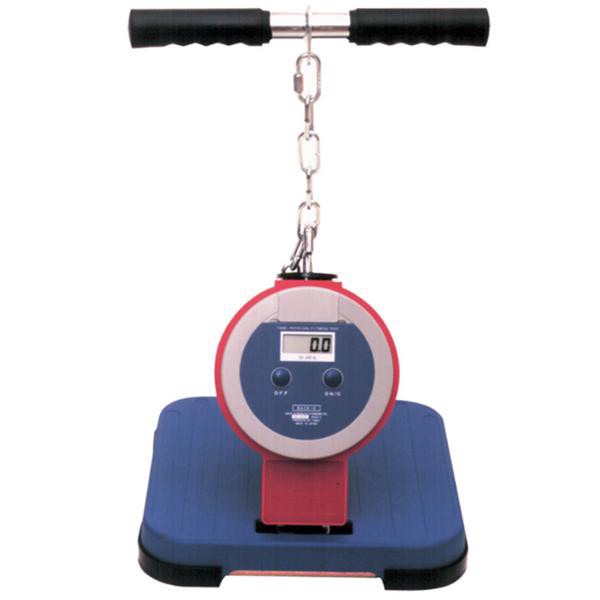
Takei Back and Leg Dynamometer
For measuring the strength of the back and leg. This Back and Leg Dynamometer from Takei provides a base for sure footing, a large, easy-to-read display and an adjustable hand-grip chain to accommodate height differences.
The Takei Back and Leg Dynamometer measures peak pull force of the large muscle groups, these include:
- Legs
- Trunk
- Shoulders
- Arms
3. Takei Jump Meter
A powerful tool for measuring explosive lower body power, particularly relevant for athletes in jumping or sprinting sports.
This dynamometer is invaluable for assessing vertical jump performance and monitoring training progress. By providing precise measurements of jump height and force output, it helps coaches and trainers design targeted programmes to enhance explosive power. Studies have demonstrated that jump performance is a reliable indicator of athletic potential in sports like basketball, volleyball, and track and field. For rehabilitation professionals, the Takei Jump Dynamometer aids in evaluating recovery progress and ensuring readiness to return to high-impact activities.
https://academic.oup.com/ageing/article/47/1/144/4097569
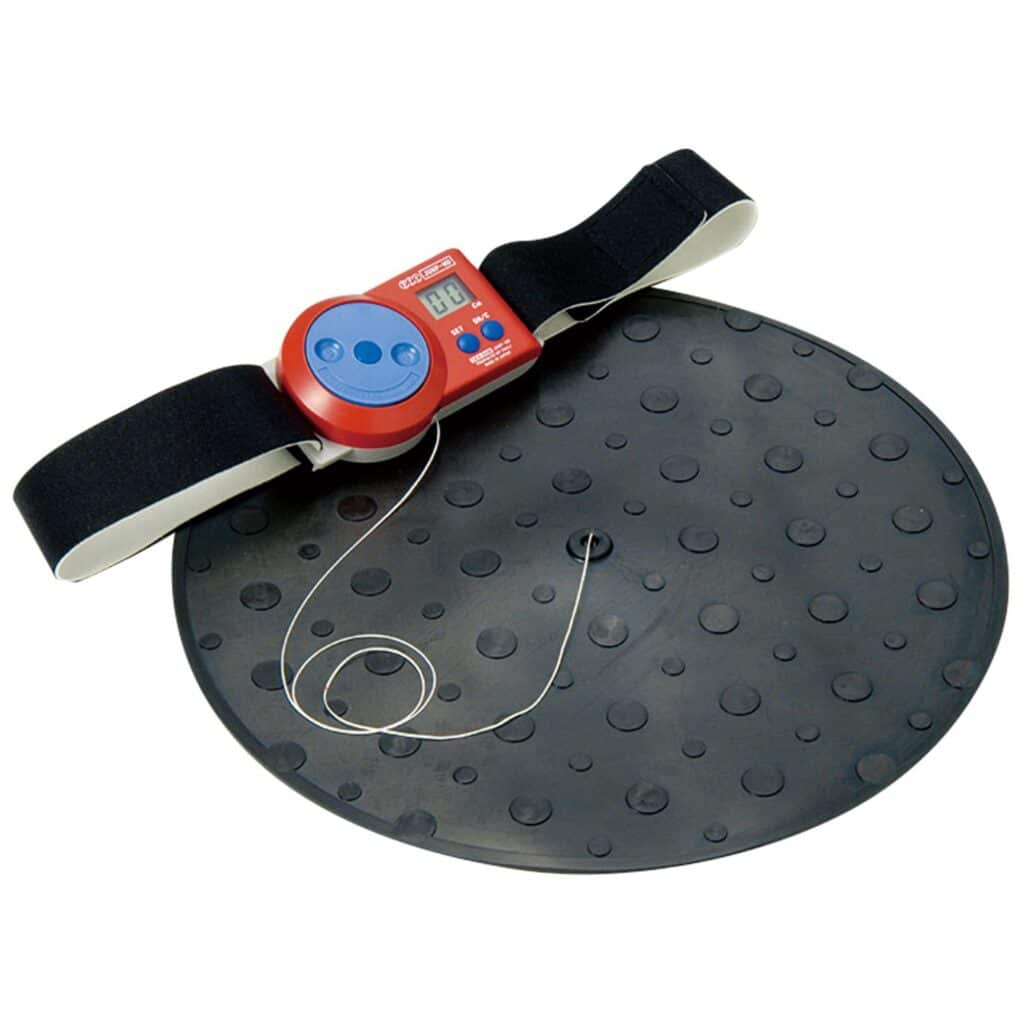
Takei Jump Meter
Takei Jump Meter measures how high a person can jump from a standing start.
It includes an adjustable waist belt with a cord secured to a rubber mat, with a large easy to read digital display.
Takei Functional Strength Testing in Practice
Imagine a scenario where a professional rugby player wants to improve their performance. By using the Takei Grip Strength Dynamometer, their trainer identifies that their grip strength is below average for their position. This insight allows the trainer to incorporate targeted grip-strengthening exercises, leading to better ball-handling skills and reduced injury risk.
Similarly, a physical therapist working with an injured marathon runner could use the Takei Back and Leg Dynamometer to assess leg strength during recovery. The data helps ensure the injured leg regains its full strength before the athlete returns to training, reducing the risk of re-injury.
Beyond the Numbers
Functional strength testing goes beyond traditional gym metrics, offering insights that can elevate performance, prevent injuries, and aid recovery. With Takei Muscle Strength Testers, professionals have a reliable, easy-to-use tool to make functional strength testing accessible and effective.
By integrating these devices into your practice, you not only gain a deeper understanding of muscular health but also empower individuals to reach their full potential—whether in sports, fitness, or everyday life.
Ready to Learn More?
Explore the full range of Takei Muscle Strength Testers here. Whether you’re a coach, therapist, or fitness enthusiast, these devices can transform the way you assess and improve functional strength. Contact us today for expert advice and support!
General Enquiry
* indicates required fields



